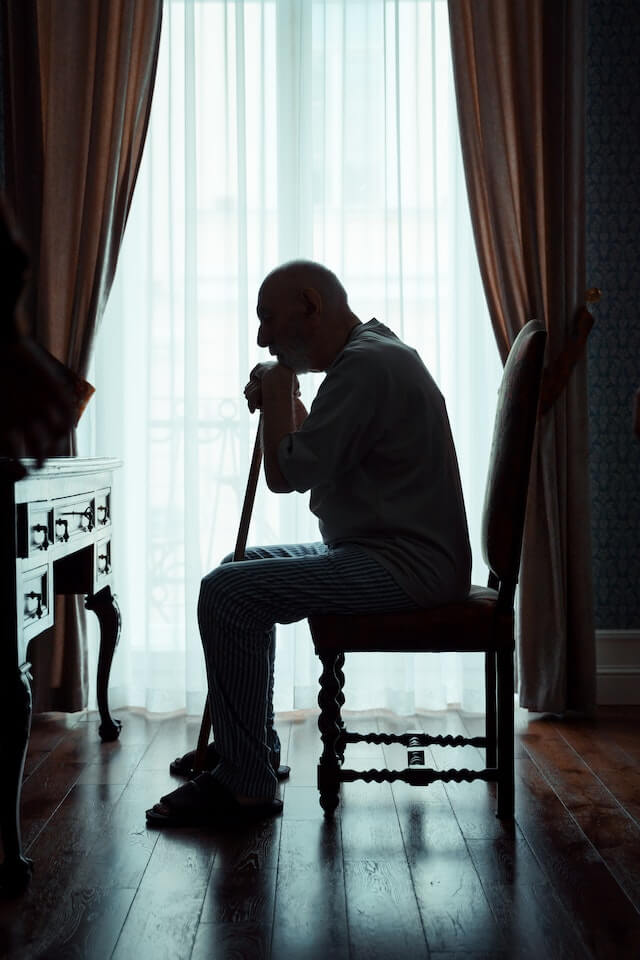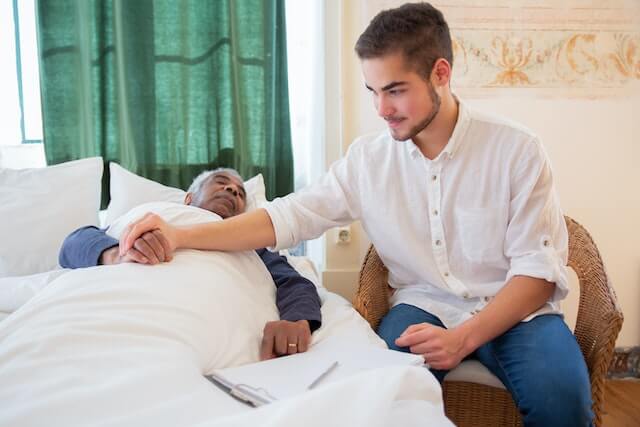People change with age, and so do behavior and personality as people get older. Older adults or aging parents tend to be or become more aggressive, and taking care of them can often be challenging.
Sometimes it can be tough to handle a situation with sudden outbursts of unpleasant behaviors without warning that may have a negative effect on the environment. Often, caregivers have to deal with temper tantrums.
Understanding why older adults are always moody, impatient, or lash out without apparent reason can help you handle a situation better.
So, why do older people get mean? Let’s find out!
What Are The Real Causes Of Mean Behavior By Old People?
Aging can cause mean behavior in older people due to many reasons. Not only they’re easily irritated, but they also tend to have anger issues. It’s mainly because, with age, several changes occur in the body that can lead to behavioral changes or can also be due to their stubbornness.
However, unpleasant behaviors commonly happen due to physical discomfort, loneliness, or dementia.
Four natural causes of mean behavior in older adults:
Hormonal Imbalance – Hormonal changes impact overall health. With age, the hormone levels like estrogen and testosterone gradually decrease, which can contribute to symptoms like period issues, infertility, and other physical changes. As such, these changes can cause anxiety, sensitivity, aggression, and more.
In women, declining estrogen levels often lead to menopause, hair loss, and fatigue. Similarly, men experience changes like decreasing strength, baldness, weight gain, and more due to reduced testosterone levels.
As a result, these changes are more likely to cause depression or stress and can agitate a person.
Dementia Or Cognitive Impairment – Memory loss and thinking problems are common in older adults. These issues significantly affect their behavior.
Dementia or cognitive decline can worsen with age, causing them to have issues remembering or understanding new things, which then leads to a sudden outburst of anger due to frustration. People with these symptoms find difficulty controlling their behavior as they can have trouble communicating and may feel confused.
The most common symptoms include memory loss or the inability to recall the name of a particular place or person. If you notice such behaviors in older adults, it can be a sign of dementia or cognitive decline.
The best you can do for them is to be compassionate to help them calm down. Luckily, professional care and medication may help slow down the progression of these symptoms.
Chronic Illness Or Physical Discomfort – As we get older, our body goes through several changes, and we tend to be less active as our energy level drops. Similarly, older adults are more prone to face health-related issues such as weak immune systems, joint and bone issues, back and neck pain, balance issues, respiratory problems, and more.
Mainly, the discomfort caused by chronic illness may prevent them from getting a good night’s rest or resting comfortably and can aggravate the issue. Or they may find it difficult to pinpoint the exact cause of discomfort that can push their buttons and cause them to lose patience.
Loss Of Hearing Or Weak Vision – Loss of hearing or weak vision, also known as dual sensory loss, is a common aging problem. With age and time, our eyelids’ muscles tend to weaken, so most adults start to wear glasses as they age.
Aside from numerous changes in our body inside and out, the ear also begins to change. Typically, the ears produce excessive earwax, and the eardrum stiffens. All these changes often lead to hearing loss.
As a result, the changes in eyes and ears can cause older adults to find it challenging to read prints and may also become sensitive to light.
Thus, older people tend to be irritable or grumpy as they cannot read or hear normally like they used to.
Getting old is no fun. Similarly, dealing with angry older adults can be highly challenging as they go through several changes, which can be stressful and scary, causing them to lash out.
However, these behaviors are understandable, and they require more attention. So, it’s best to show compassion and be as kind as possible.
What Events Can Trigger Bad Behavior By Old People?
Older people don’t display lousy behavior because they want to. But several changes happening within them can cause them to act or behave differently. Likewise, knowing what events trigger negative behavior in older adults can help you understand better.
Four events that can trigger bad behavior in older people
Difficulty In Communicating – In older people, communication barriers are nothing new, and the most typical reasons can be shaky vision, weak facial muscles, stuttering, hearing problems, and more. For example, the inability to express their emotion or failure to find the right words might cause them to burst with anger.
Some common communication problems with the elderly:
- The generational gap is one chief factor that causes communication barriers with the elders. As time changes, the way of communicating changes, vocabulary expands, and new words develop, making it difficult to have discussions.
- The most common misconception about the elders is that they cannot hear appropriately, leading to shorter or no conversation. Though hearing loss is normal, not all elders lose their sense of hearing.
- Medical conditions or health issues can sometimes make it difficult for them to speak normally. As such, there can be speech problems, language impairment, and vocal fatigue. But these issues do not alter their way of thinking or understanding. So allowing them to express themselves comfortably can avoid negative behaviors.
Boredom Or Loneliness – Older people suffer from loneliness and can lash out when tired of being bored or alone. Keeping them occupied with activities can significantly help their psychological well-being in such a situation.
Also, busy lifestyles mean less time with the elders, affecting their mental health. Moreover, losing a loved one or their circle becoming smaller can make them feel lonely.
Socially Challenged – Even if they can manage to get through physical changes, adapting to social changes can be highly challenging. Technological advancement and consumer trends, such as bill payment, ordering food online, and cab booking apps, have evolved rapidly. Hence, these changes can be overwhelming and may cause them to lose patience.
Frustration – Frustration among the elders is nothing new. It can happen even due to minor issues, such as the inability to tie their shoelaces, fasten shirt buttons, or hunger and thirst. In such circumstances, rushing them doesn’t help. Instead, give them the time to do things at their own pace.
Also, going through challenging situations and several physical changes can prevent them from carrying out mundane tasks, and is highly prone to injury. Hence, assisting them with their homework can help them deal with daily tasks confidently.
So, Are Old People Depressed Or More Depressed Than Younger People?
Depression can hit anyone at any stage, but older people have a higher risk of developing depression. It can happen for several reasons and affects younger and older people differently. Moreover, the symptoms of depression also vary.
In older people, depression is often because of health issues or medical problems. But the good news is that several treatments are available to combat depression, and it’s recoverable with the proper treatment. Also, age does not reduce the efficacy of treatments.
Also, just because older adults suffer from depression due to health issues doesn’t mean you will too.
Older people often fall into depression when dealing with medical and health problems. So it’s unusual to see a healthy depressed adult, but you never know. Depression can occur due to age or sickness, but most adults shy away from addressing the problem feeling shame or guilt or are too stubborn to admit that they’ve fallen into depression. Unfortunately, such circumstances can cause delays in treatment.
Feeling sad or blue is quite common, and anyone can feel down at some point. But if someone seems unhappy for over two weeks and that’s affecting their daily tasks, they may be experiencing depression.
Depression in older people can increase the risk of cardiac diseases, heart attacks, and suicide. So it’s crucial to have them checked regularly and treated if you have an older adult at home.
As mentioned, older people and younger people show different symptoms of depression. In adults, the most common signs would be feeling down or not wanting to participate in any activities. Or they can also experience symptoms like confusion, insomnia, dizziness, inability to pay attention, aches, pains, loss of appetite, and more.
Furthermore, they can also show signs of behavior change. As such, they may want to stay inside the house all the time, not showing interest in things and hobbies like they used to, hoarding, or drinking alcohol excessively.
If you notice or think that your loved one or someone you know is experiencing depression, help them by encouraging them to speak up and seek medical help. Or you can also spend some time conversing with them to make them feel less isolated so they don’t fall into depression.
Are There Any Ways To Make Old People Happier?
Of course, there are so many ways and things you can do to make older people happier. Happiness is essential, and making them more comfortable can improve their world. Senior people love when youngsters spend time with them or join them in their daily activities.
So why not spend more time with the elderly and join them in their hobbies? It’ll surely make a big difference!
Five ways to make older people happier
Encourage Them To Do Physical Activities – The best way to release endorphins is through physical exercises or activities that older people need more.
They can experience several health issues with age, like joint pain or backache, and endorphins work like painkillers. This chemical released during physical activities can help relieve stress or pain. Hence, activities like running or walking are beneficial.
However, adults tend to be less energetic than youngsters. So knowing what kind of activity best suits them can be beneficial in the long run.
Engage In Conversation – It’s pretty standard for older people to feel lonely as everyone around them seems so busy with their daily activities. But they know lots of worldly wisdom, and you can benefit from them by conversing with them. What they know holds so much value that it’s worth listening to!
If you listen closely, there’s so much you can learn from life lessons to old tales and more. These conversations can bring you closer and make the elderly feel valued, knowing they have shared valuable life lessons and forgotten stories with the younger generation.
Join Them In Doing What They Love – Hobbies make life exciting, and finding people with similar interests brings great joy. So why not join them in their hobbies and bring a smile to their faces? This trick will indeed work wonders in making them happier.
Also, joining in with their hobbies can help their brain and memory to exercise, will keep them engaged, and, most importantly, they will feel less lonely. So this means fewer chances of developing depression.
Whether it be chess, sudoku, bingo, puzzles, birdwatching, or knitting, joining them can elevate the fun, and you can also learn something new.
Help Them To Think Positively – There’s no doubt that people may feel less confident about their appearance and overall body with age. So this can be a massive setback for adults to think positively, especially if they have health issues. And these changes can be easy prey for them to feel sad and fall into depression.
So, you have to help them have a positive outlook on life so they can carry on with an optimistic attitude. Ensure that they spend time with people who can lift them and have an optimistic mindset so they can learn to regulate their emotions.
Are There Any Ways To Prevent Us From Becoming Mean When We Get Old?
Do you want to avoid being called a “grumpy old man/woman” when you grow old? You should know how to prevent certain situations from triggering your patience or anger so you can be less irritable.
Growing old is something that nobody can control, but knowing how to manage your mood swings is a big yes! The older you get, the crankier you become. This is something younger people usually say and is natural with aging.
But there are so many ways that can help you in preventing yourself from becoming mean with age. For example, you can make new friends in the neighborhood with people the same age as you, invest your time learning a new hobby, or volunteer with various organizations and help the needy.
The options are plenty. You have to find and look for what you love so you can invest your time efficiently. Also, even if you get bored with a particular hobby, there are still more you can choose from.
Here are some tips to make your golden years fun and age gracefully:
- Take care of your hygiene
- Visit friends and family
- Be patient with kids
- Try to learn and adapt to the latest technologies
- Do exercises or yoga
- Go for group activities like singing, hiking, or crosswords
- Learn to forgive and forget
- Be compassionate
- Avoid compulsive behaviors
Three habits to cultivate to manage anger issues when old:
- Try To Be Socially Active – Being friendly with people around you can help you maintain positivity. Connecting with friends and family is essential, even if you’re an introvert. So try to build relationships with people who share your interests. Go to events, invite friends and family for a tea party, thanksgiving, coffee, etc.
- Avoid Complaining About Health Conditions – Complaining about your health issues will not help you get any better. Instead, try discussing your physical struggles so that you may get some valuable tips in return.
- Do What You Love – Doing what you love will make you happier. Participate in activities, have several hobbies, and always try to learn something new. Even when you grow old, there will be many things that you wish you knew. So why not engage yourself in doing what you’ve always wanted to do or learn? It can be baking or learning a new language. Know that you’re never too old to try or learn new things!
Conclusion
Now you have the answers if you’ve always been curious about why older people are grumpy. Getting older changes a person’s behavior as one goes through several physical and internal changes that can be stressful and frightening.
As hard as it may be for them, it can be equally challenging to keep up with their mood swings and tantrums. But luckily, there are many things that you can do to divert their attention and bring them toward positivity. You can help them by taking them out to try new food items, keeping them occupied, and spending more time with them.



